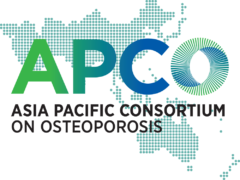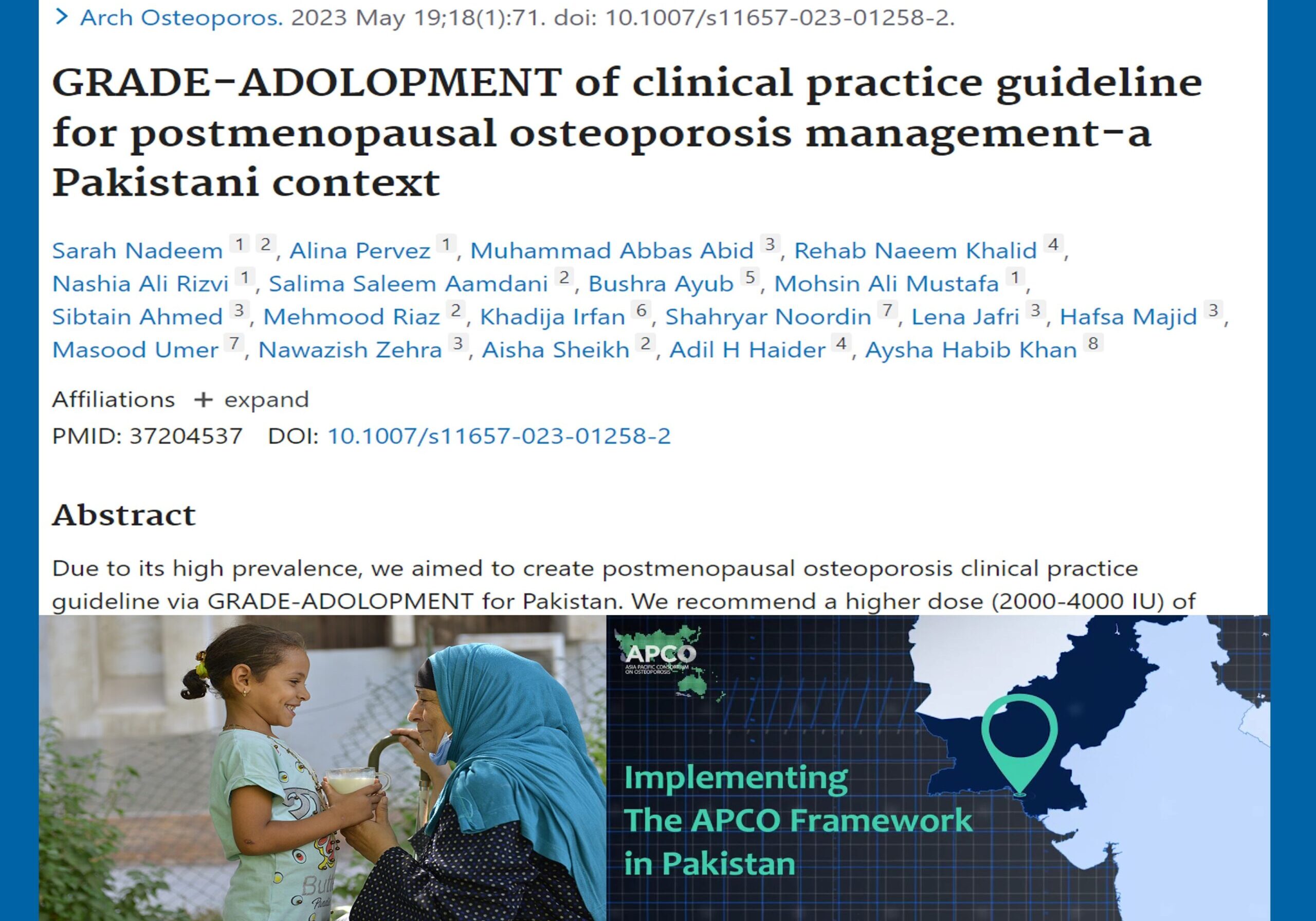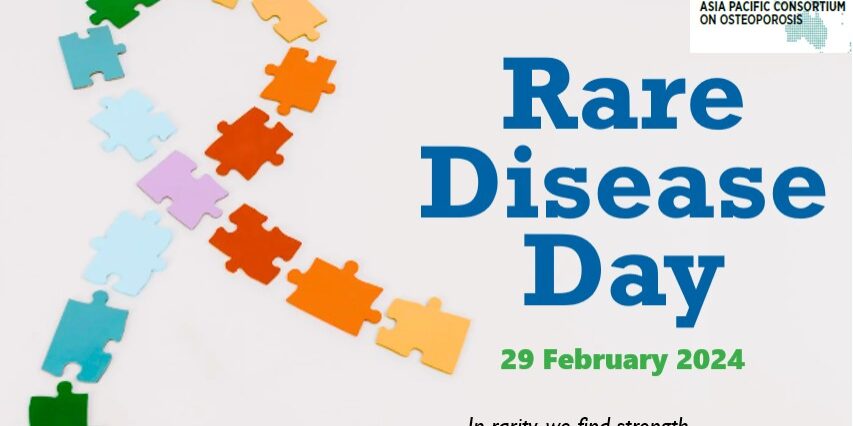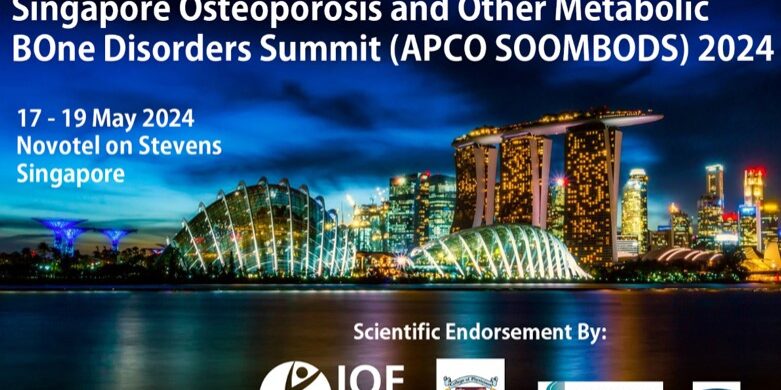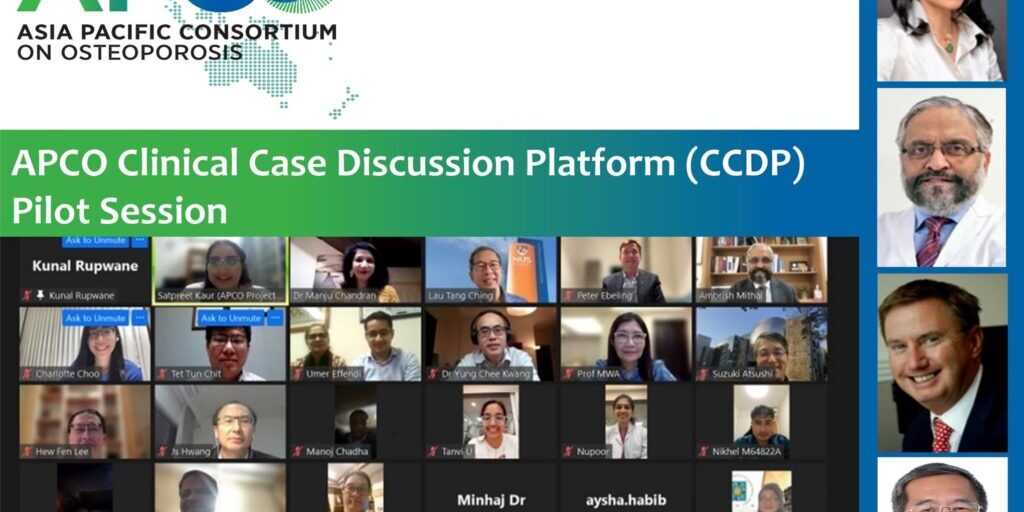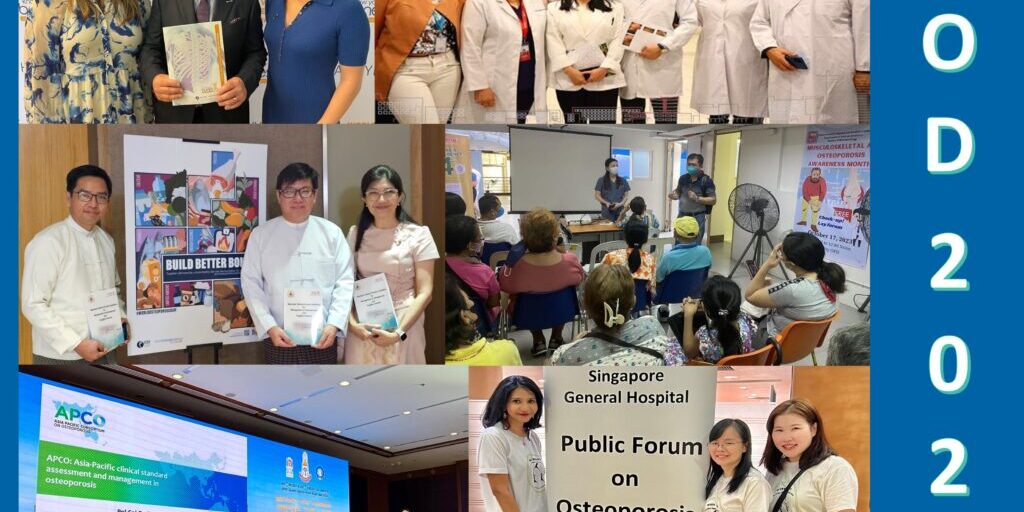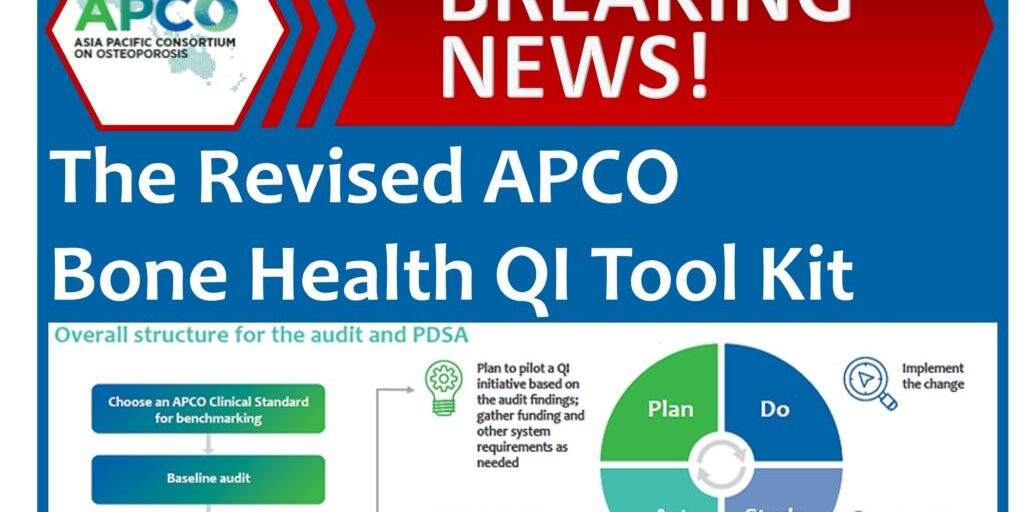The First Clinical Practice Guidelines for Enhancing Post Menopausal Osteoporosis Care in Pakistan: Adapting the APCO Framework and AACE Recommendations
A global health concern, Osteoporosis, especially in developing nations like Pakistan where limited resources, misconceptions, and a lack of country-specific guidelines have hindered the effective management (1), demands urgent attention. A big step forward has however been made with the development of the first clinical practice guidelines for post-menopausal osteoporosis in Pakistan. This landmark document was developed using the GRADE-Adolopment process (2) and utilized the Asia Pacific Consortium on Osteoporosis (APCO) Framework and the American Association of Clinical Endocrinology (AACE) recommendations as foundational references (3, 4). The APCO Framework grouped under the 5IQ approach viz – identification, investigation, information, intervention, integration, and quality and comprising 16 Minimum Standards of Care along with four emerging themes, served as a robust starting point for discussions on the structure of the guidelines and provided a comprehensive base .
The guidelines development was executed through a close collaboration between the Bone & Mineral Disease Research Group at the Aga Khan University, Pakistan, it’s Centre for Clinical Best Practices and the GRADE-USA working group. The ‘Clinical practice guidelines for the diagnosis and treatment of post-menopausal osteoporosis – 2020 update from American Association of Clinical Endocrinology’ (4) were carefully analysed and modified to adopt, exclude, or adapt the recommendations to ensure the guidelines were well-aligned with the local context. In addition, the guidelines were customized to meet the country’s unique challenges and requirements by incorporating Pakistan-specific risk factors, epidemiological data, and clinical practices. The modification process involved a concerted effort with experts in the field, other healthcare professionals, and key stakeholders coming together.
While the majority of the APCO Framework’s 16 Minimum Standards of Care were successfully integrated into the Pakistani guidelines, there were a few exceptions. Notably, the Quality Improvement (QI) and Cost Effectiveness standards advocated in the APCO Framework could not be adopted into the current iteration of the Pakistan guidelines. The QI standard, emphasizing continuous quality improvement in osteoporosis care, posed challenges due to resource constraints and infrastructure limitations in the Pakistani healthcare system. However, efforts are underway to explore feasible quality improvement strategies within the local context. Similarly, although the specific APCO standard related to cost-effectiveness was not directly incorporated, the guidelines did consider the affordability and accessibility of recommended interventions and treatments and the evidence-based and pragmatic recommendations made, did take into account local socioeconomic factors.
The guidelines highlighted several crucial recommendations to enhance osteoporosis management in post-menopausal women. One significant aspect involved optimizing vitamin D supplementation. It was recommended that a higher dose (2000-4000 IU) be used in patients who are obese, have malabsorption issues, or are elderly. This adaptation from the source guideline is justified by the suboptimal response observed with lower doses in these specific patient groups in Pakistan. However, it was suggested that to ensure patient safety, baseline vitamin D and calcium levels should be assessed before prescribing supplements.
Food insecurity and malnutrition are prevalent challenges in Pakistan, particularly among vulnerable groups such as older women. Vitamin D plays a crucial role in calcium absorption and bone health, making its supplementation vital for individuals with low dietary calcium intake. Vitamin D supplements are cost-effective and offer numerous benefits, including reducing the risk of fractures, related healthcare costs, and potential complications. In addition, injectable vitamin D provides higher bioavailability and greater patient compliance, making it a viable option in resource-constrained settings.
The guideline also recommends using the surrogate FRAX model for Pakistan, which the International Osteoporosis Foundation recommends for countries lacking fracture incidence data (5, 6). The surrogate FRAX model created for Pakistan enables a more accurate estimation of fracture probability. Intervention thresholds guiding clinical practice, have been developed for Pakistan using this model. A management algorithm has also been proposed for women without a prior fragility fracture, emphasizing the importance of clinical risk assessment and considering BMD measurement if available.
Conclusion
The development of country-specific guidelines for post-menopausal osteoporosis care in Pakistan marks a significant advancement in addressing this pressing health issue. By adopting the APCO Framework and incorporating the AACE recommendations tailored to the local context, Pakistan has taken a crucial step towards enhancing osteoporosis management. By basing the recommendations on a high-quality source guideline and analyzing the available evidence, the guidelines gain credibility and are more likely to be adopted by local physicians. Furthermore, the comprehensive GRADE process ensured the validity of the guideline, providing healthcare professionals with evidence-based recommendations.
Moving forward, it is essential to continue refining these guidelines, considering emerging research, and reassessing challenges related to quality improvement and cost-effectiveness. By leveraging the recommendations in this guideline, healthcare providers in Pakistan can deliver improved care, enhance patient outcomes, and ultimately contribute to the population’s overall well-being.
To read more about the guidelines, click here.
Written by APCO Chairperson – Prof Manju Chandran, APCO Executive Committee Member – Prof Aysha Habib Khan and Dr Alina Pervez.
References:
- Khan AH, Chandran M. Need for Clinical Guidelines for Management of Osteoporosis and Way Forward for Pakistan. J Coll Physicians Surg Pak. 2021;31(4):371-2.
- Nadeem S, Pervez A, Abid MA, Khalid RN, Rizvi NA, Aamdani SS, et al. GRADE-ADOLOPMENT of clinical practice guideline for postmenopausal osteoporosis management—a Pakistani context. Archives of Osteoporosis. 2023;18(1):71.
- Chandran M, Mitchell PJ, Amphansap T, Bhadada SK, Chadha M, Chan DC, et al. Development of the Asia Pacific Consortium on Osteoporosis (APCO) Framework: clinical standards of care for the screening, diagnosis, and management of osteoporosis in the Asia-Pacific region. Osteoporos Int. 2021;32(7):1249-75.
- Camacho PM, Petak SM, Binkley N, Diab DL, Eldeiry LS, Farooki A, et al. AMERICAN ASSOCIATION OF CLINICAL ENDOCRINOLOGISTS/AMERICAN COLLEGE OF ENDOCRINOLOGY CLINICAL PRACTICE GUIDELINES FOR THE DIAGNOSIS AND TREATMENT OF POSTMENOPAUSAL OSTEOPOROSIS-2020 UPDATE. Endocr Pract. 2020;26(Suppl 1):1-46.
- Naureen G, Johansson H, Iqbal R, Jafri L, Khan AH, Umer M, et al. A surrogate FRAX model for Pakistan. Arch Osteoporos. 2021;16(1):34.
- Johansson H, Naureen G, Iqbal R, Jafri L, Khan AH, Umer M, et al. FRAX-based intervention thresholds for Pakistan. Osteoporos Int. 2022;33(1):105-12.
